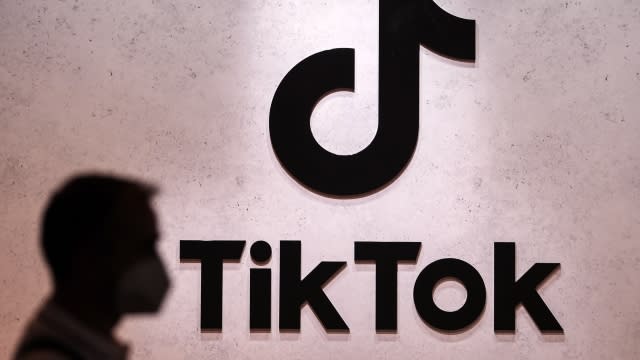How TikTok became a 'battlefield' in Russia's war with Ukraine

TKFFF · 2024-03-27 11:43
 A visitor passes the TikTok exhibition
A TikTok video portraying a father and daughter, luxury cars and glamorous homes doesn’t seem out of the norm for the social media platform. But when that father is a former defense minister of Ukraine, and an AI voiceover falsely claims he misused Western funds to fund a lavish lifestyle, the TikTok has malicious intentions.
This TikTok video would become a “breadcrumb” to a massive Russian disinformation investigation, according to Andy Carvin, senior fellow and managing editor of the Atlantic Council Digital Forensic Research Lab. The TikTok video included old photos of Oleksii Reznikov, who was Ukraine's minister of defense until 2023, and his daughter Anastasia Shteingauz. It also used images traced back to real estate listings of, at the time, unpurchased property, according to Digital Forensic Research Lab (DFRL).
Ultimately, the TikTok video was disseminated across thousands of fake TikTok accounts, according to a new report by the DFRL on Russia’s disinformation campaigns. In many cases, it was the only post on these accounts.
“The whole lot of them, when combined, clearly had a shared message of trying to convince the public that the Ukrainian government is corrupt, and they can't be trusted,” Carvin told Scripps News.
That “lot” amounted to nearly 13,000 TikTok accounts, which had a combined total of over 800,000 followers.
A TikTok spokesperson told Scripps News the company was aware of these fake accounts before the DFRL investigation and removed them from the platform.
“It was the largest information operation that they had ever seen on the platform. And their investigation concluded it was coming from Russia,” Carvin said. "With over a billion users, 13,000 accounts on TikTok are a drop in the bucket. But in the realm of disinformation, this network is valuable. The fact that Russia has determined that the network is valuable enough as a mass medium platform that they invested all of this time, quite probably a lot of money as well to create these accounts.”
TikTok isn’t the only battlefield in Russia’s disinformation war, Carvin said. Facebook, X (formerly Twitter), YouTube and Telegram are all parts of Russia’s ever-expanding information war which seeks to discourage support for Ukraine — especially from Western countries like the United States.
“Battles are no longer purely won on physical battlefields. There are cultural and informational battlefields taking place, constantly. And they're taking place everywhere, even in places where there's no war going on,” Carvin said.
This information attack on Ukraine isn’t new, the DFRL’s report says. What’s different is that these campaigns are no longer just targeting Ukrainian President Volodymyr Zelenskyy, but government officials, military figures, and local authorities, according to the DFRL’s report.
And the battle strategies have evolved.
Russia’s disinformation campaign has gone a step further since the war in Ukraine: cloning legitimate and trusted news websites.
“You just copy and paste the website, from the original version, make some adjustments to it, and drop in whatever messaging you want, that you're trying to convince the public,” Carvin said. "In what is commonly referred to as Operation Doppelganger or the Doppelganger Campaign, which began in 2022. Bad actors use this technique to just add that extra layer of credibility to their messages. All it takes is people to start sharing a link without thinking very hard,” he added.
Another technique combines social media videos and impersonating news websites. Through videos pretending to be from the BBC, pro-Russian social media sources amplified false allegations that Ukraine re-sold weapons to drug cartels and terrorist groups like Hamas.
“Part of the role of these campaigns is to confuse the public to the point where they truly believe nothing anymore,” Carvin said.
Russia's information war against Ukraine remained in full swing this week after Russian President Vladimir Putin recently claimed without proof that Ukraine was involved in the terror attack outside Moscow last week.
Carvin said Russia is in the anti-Ukraine disinformation war “for a long haul.” That longevity is currently playing out in the U.S., where there is a growing partisan divide over continuing aid to Ukraine.
“From Russia's perspective, all they have to do is wear down enough of the public and enough policymakers around the world that things shift away from some countries and individuals supporting Ukraine.”
[ad]
A visitor passes the TikTok exhibition
A TikTok video portraying a father and daughter, luxury cars and glamorous homes doesn’t seem out of the norm for the social media platform. But when that father is a former defense minister of Ukraine, and an AI voiceover falsely claims he misused Western funds to fund a lavish lifestyle, the TikTok has malicious intentions.
This TikTok video would become a “breadcrumb” to a massive Russian disinformation investigation, according to Andy Carvin, senior fellow and managing editor of the Atlantic Council Digital Forensic Research Lab. The TikTok video included old photos of Oleksii Reznikov, who was Ukraine's minister of defense until 2023, and his daughter Anastasia Shteingauz. It also used images traced back to real estate listings of, at the time, unpurchased property, according to Digital Forensic Research Lab (DFRL).
Ultimately, the TikTok video was disseminated across thousands of fake TikTok accounts, according to a new report by the DFRL on Russia’s disinformation campaigns. In many cases, it was the only post on these accounts.
“The whole lot of them, when combined, clearly had a shared message of trying to convince the public that the Ukrainian government is corrupt, and they can't be trusted,” Carvin told Scripps News.
That “lot” amounted to nearly 13,000 TikTok accounts, which had a combined total of over 800,000 followers.
A TikTok spokesperson told Scripps News the company was aware of these fake accounts before the DFRL investigation and removed them from the platform.
“It was the largest information operation that they had ever seen on the platform. And their investigation concluded it was coming from Russia,” Carvin said. "With over a billion users, 13,000 accounts on TikTok are a drop in the bucket. But in the realm of disinformation, this network is valuable. The fact that Russia has determined that the network is valuable enough as a mass medium platform that they invested all of this time, quite probably a lot of money as well to create these accounts.”
TikTok isn’t the only battlefield in Russia’s disinformation war, Carvin said. Facebook, X (formerly Twitter), YouTube and Telegram are all parts of Russia’s ever-expanding information war which seeks to discourage support for Ukraine — especially from Western countries like the United States.
“Battles are no longer purely won on physical battlefields. There are cultural and informational battlefields taking place, constantly. And they're taking place everywhere, even in places where there's no war going on,” Carvin said.
This information attack on Ukraine isn’t new, the DFRL’s report says. What’s different is that these campaigns are no longer just targeting Ukrainian President Volodymyr Zelenskyy, but government officials, military figures, and local authorities, according to the DFRL’s report.
And the battle strategies have evolved.
Russia’s disinformation campaign has gone a step further since the war in Ukraine: cloning legitimate and trusted news websites.
“You just copy and paste the website, from the original version, make some adjustments to it, and drop in whatever messaging you want, that you're trying to convince the public,” Carvin said. "In what is commonly referred to as Operation Doppelganger or the Doppelganger Campaign, which began in 2022. Bad actors use this technique to just add that extra layer of credibility to their messages. All it takes is people to start sharing a link without thinking very hard,” he added.
Another technique combines social media videos and impersonating news websites. Through videos pretending to be from the BBC, pro-Russian social media sources amplified false allegations that Ukraine re-sold weapons to drug cartels and terrorist groups like Hamas.
“Part of the role of these campaigns is to confuse the public to the point where they truly believe nothing anymore,” Carvin said.
Russia's information war against Ukraine remained in full swing this week after Russian President Vladimir Putin recently claimed without proof that Ukraine was involved in the terror attack outside Moscow last week.
Carvin said Russia is in the anti-Ukraine disinformation war “for a long haul.” That longevity is currently playing out in the U.S., where there is a growing partisan divide over continuing aid to Ukraine.
“From Russia's perspective, all they have to do is wear down enough of the public and enough policymakers around the world that things shift away from some countries and individuals supporting Ukraine.”
[ad]
文章来源: Aol.
TKFFF公众号
扫码关注领【TK运营地图】

TKFFF合作,请扫码联系!

文章来源: 文章该内容为作者观点,TKFFF仅提供信息存储空间服务,不代表TKFFF的观点或立场。版权归原作者所有,未经允许不得转载。对于因本网站图片、内容所引起的纠纷、损失等,TKFFF均不承担侵权行为的连带责任。如发现本站文章存在版权问题,请联系:1280199022@qq.com
分享给好友:

















